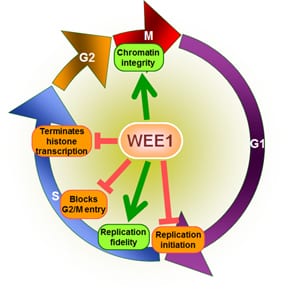WEE1 kinase has been reported to be aberrantly expressed in melanomas, glioblastoma multiforme (GBMs), triple negative breast cancers (TNBCs) and prostate cancers. Dependence of various cancer cells on WEE1 signaling suggests that targeting epigenetic activity of WEE1 is a viable strategy for overcoming tumor proliferation.
We designed an assay that provides specific and quantitative measure of WEE1 epigenetic activity. Library screen identified a new class of scaffolds, that efficiently suppressed WEE1 epigenetic activity and have shown propensity to overcome WEE1 mediated cell cycle regulation.
Feel free to contact us if you are interested in exploring these novel inhibitors in your system.
